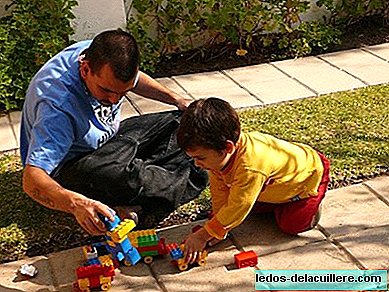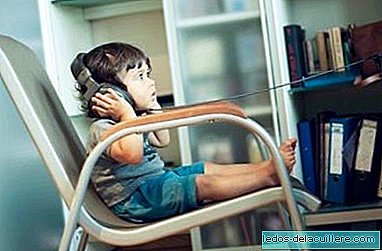
Recently we saw that, to help stimulate language, parents must adapt our language to the child.
But there comes a time when not only just talk to him, but it is also important attend and listen to all communicative attempts of the child. If we know how to listen, we will encourage, with our interest, our son to speak.
But not all parents know how to listen as it is due to the child. If we are active and impatient, in addition to being unable to wait for our son to finish speaking, we impede his attempts to speak and, as a consequence, we should not be surprised if we notice that his expressive capacity does not develop.
It also happens many times that when a family member or an adult family friend starts talking to the child, and parents are present, before he can respond, they anticipate answering leaving him with the word in his mouth.
This attitude makes the child feel deprived of the possibility of making himself understood with the other person. Obviously, parents know better than anyone else the vocabulary of our children and their way of expressing themselves; but facing strange situations in which the child has to overcome shyness and talk, is very stimulating for the development of verbal fluency.
On the other hand, it may happen that we do not interrupt the child when he speaks, but we do not know how to listen to him for a long time, only half-listening to him (for example: being reading the newspaper while our child tells us that he has seen in the park a lot of ants ). This is as if the child spoke with a chair.
When we talk to our son, we must adopt a positive attitude in the face of what he is telling us, making him see that we are interested in what he tells us and show him our pleasure in his attempts to speak better and tell us things.
These situations occur more frequently than people think, since parents do not devote proper attention for various reasons such as work, fatigue ... It is also true that a child breaks down and interrupts impertinently in these delicate moments. How do parents react? Easy: we worry and order the child not to bother us or wait for us to finish.
But children, the younger, are less able to postpone those things that impress or want to know. Therefore, telling the child to wait is almost impossible. Instead, we must leave what we are doing, even for a few moments, to address and satisfy your concerns as much as possible.
If the child does not stop talking throughout the day (and obviously, we do not have so much time to listen to him), what we can do best is have a time every day to play or talk directly and exclusively with the child through shared activities: playing ball, blowing bubbles, watching cartoons, drawing, dancing ...
During these interactions, we must ensure and increase the complicit looks, emotional expressions, laughs, exclamations ... .
And how can we do that? Must organize the environment so that the moments or situations in which the child needs or feels motivated to communicate are multiplied; It's not about imposing on him to talk. In saying, we have to complicate our children's lives a little so that they feel the need to verbally express what they want or need, since otherwise they will not be able to obtain it.
For this we can do several things:
- Identify the activities and objects that attract the child
- Difficult the child's access to these preferred activities and objects
- Give our son what he wants little by little, to ask us for more (For example, if we are doing a puzzle together, we will not leave the pieces at your fingertips; we will have them to give them to you when you ask for them)
- Share toys that he just doesn't know how to start
- Use toys that need more than one person to play(ball, rackets ...)
One of the most used techniques to enhance communication exchanges is the so-called creative stupidity. It consists of making mistakes in some games or routines of daily life to get our child's attention:
- Discontinue some joint activity that we are doing (we can be playing blowing bubbles. We blow and make one. Then, before doing another, we stay in suspense waiting for him to tell us what he wants us to do)
- Skipping a step in a routine (such as putting on a shoe without first putting on the sock or storing a dish before washing it)
- Using an object incorrectly (giving a fork to eat the soup or using a shoe to try to open a lock are effects that attract a lot of attention and that will make us say that this is not done, in addition to causing great laughs)
- Ask for impossible things (for example, try to put a ball in a matchbox or pass the door without opening it)
- Make ourselves clueless (not finding or not knowing how something is done that they do; in this way, they will have to tell us where it is or tell us how it is done)
Whenever possible, we will increase the opportunities to choose what the child wants; This way we will increase the moments in which you can develop your language. For example, during the meal (without trying to eat what you want) we can give you a choice between two or three desserts; to dress, we can make you choose between several options ...
It is very important to keep these aspects in mind to to help stimulate children's language. Many times we forget them and then, when comparing their evolution with other children, we think that it is the child who has trouble moving forward, without considering that it is perhaps the parents who do not take advantage of all the situations they have to interact.
Soon, we will talk about different techniques that help the child learn to speak better. Do not forget that, if you have any questions, we can do it in our Baby section and more: Answers.











